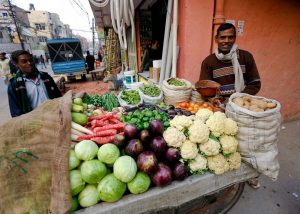People of Bharat: Tulsiram, Ahmedabad
I buy my weekly stock of vegetables from Tulsiram. His handcart is almost filled with 40 varieties of vegetables in winter; a riot of solid, comforting colors in green, white, red, yellow, purple and orange. While I regretted my purchases from elsewhere, I often wondered where he came from and how he always managed to keep his handcart stocked with fresh produce. So one windy morning I walk onto the footpath next to his cart with the intention to interview him. I find him sprinkling water over his cart; his wife sorting out the weights closeby. He hears me explain the purpose of our study while I root myself on the footpath. He settles on his haunches, with hands resting on his knees, seeming pretty much at ease.
Tulsiram Marwadi is a 30-year-old vegetable vendor originally from Padgav, Rajasthan. His parents were farmers and cultivated wheat and several varieties of vegetables on their land. They were a large family; he is the youngest of five siblings. “My father was the only earning member, but we had a peaceful upbringing. Our parents got all of us educated.” As a boy, he would join his parents in the field after school; that’s how he learnt all that he knows about vegetables. He studied till standard 8. He is married and has three children between the ages 12 and 8. His eldest daughter lives with his mother-in-law in the village and is pursuing her studies there. On asking him why she doesn’t stay with them, he reveals that she has always lived with his mother-in-law; even when she as a toddler. Tulsiram followed his brothers to the ‘big city,’ Ahmedabad in Gujarat in the hope of a better living.

Tulsiram owns a vegetable cart and he parks it right outside a premium management college located in a posh area of Ahmedabad. He keeps his cart covered with moist cloths, while tugging those under another layer of wet jute sacks. He unveils the cart at 10 in the morning and closes it from noon to evening. At this time, he goes home for lunch and a nap. Then he opens it again at 5 PM and continues selling till 11 in the night. At night he pushes the cart home. I am surprised that he leaves it unattended for almost four hours; but he assures me that no one has ever stolen anything from him. “Koi kya leke jayega?” (what will anyone take?) His brother owns a similar cart and stands right next to him.
Tulsiram lives in a one-room urban slum dwelling with an asbestos sheeting for a roof with his wife and two other children. He doesn’t have a ration card. He has a bank account with Bank of Baroda. He owns a rickshaw which he bought a couple of years back to supplement his income. He took a loan for the rickshaw which cost him 1 lakh 30 thousand rupees, which he has already paid off. He doesn’t own a smartphone, “Mera dabla phone hai. (I have an old box for a phone)” he adds waving an old Nokia handset in front of me. He also rides a rickshaw for a living while his wife attends to the vegetable cart. However, most passengers are on the lookout for a ride only during the hot summer months or while it’s pouring. Other times, which is most of it, the rickshaw remains on a standby; right next to his cart.
Tulsiram goes to the Kalupur vegetable market at 5 in the morning. He purchases vegetables from a retailer, for the day. He spends about Rs. 2000 a day on fresh produce. I ask him why does he not buy them from a wholesaler. He explains how he would have to buy in bulk from a wholesaler, and for veggies such as coriander, which gets sold in sacks of 30 to 40 kilos each, he lacks the means (or the need) to buy so much of just one vegetable. He needs only a kilo or two of coriander. He prefers to buy the best quality of fresh produce. His customers matter the most and the quality he offers makes them come back to him. He prefers to procure the best quality produce, even if he has to pay 5–10 rupees extra for it. “Sab vepari ke maal ek jaisa nahi hota. Koi do number ka bhi maal bechta hai. Sabji me kitne jaat ki kolety (quality) hai.” (All merchants do not have a uniform quality of produce. Some sell cheap stuff too. There are all kinds of quality in vegetables.) He differentiates the different varieties available in quality: He buys tomatoes for Rs. 20 or 30 a kilo but some retailers sell tomatoes at Rs. 10 rupees per kg too. These are not of a good quality. He could earn more (in profit) if he cut his costs but then his customers will complain about the halka (cheap) quality and would stop coming back. I ask him how much profit he makes a day. ‘Sabji me kabhi munafa hota hai, kabhi nahi bhi hota hai. Who mahine ka hisaab hai, roz ka nahi.’ (With vegetables, it’s hard to calculate the daily profit. These are monthly accounts.) Sometimes he sells vegetables worth Rs. 1500 and sometimes even for Rs. 4000, provided he has enough stock; it varies from day to day.
Tulsiram spends primarily on food, rent and living. Monthly, he pays Rs. 3000 as rent and spends Rs.4–5000 on groceries. He spends another Rs. 1500 on the children’s school fees. The electricity bill issued every other month costs him Rs. 1000–1500 and he spends the same for the cooking gas cylinder. He has purchased a government life insurance for himself and his wife and pays Rs. 10,000 a year towards premiums. They save a lot. He saves his money in a Fixed Deposit in the bank, whenever and whatever he can.
Tulsiram’s family has been approached several times by NGOs and other microfinance volunteers urging him to save with them; but he avoids them. “Main wo sab main padta hi nahi hu” (I don’t get into those things). I gather, his mistrust is based on stories of people getting cheated out of their hard-earned savings. He doesn’t believe in taking money on debt either. He doesn’t buy vegetables on debt even from the retailer he trades with daily. This is his ‘siddhant’ (value). “My parents have taught me never to get into any debts. If I take Rs. 100 from a man one day, the next day I will have to make way for him; I will have to bow my head (before him).”
Tulsiram has no plans or aspirations for the future. He is satisfied with the way things are at the present. “We earn less and we eat less. But we have no tensions. (I have no wish) to earn more and beat my chest about it if it is going to get me worried. I can make do with little chilly and salt too. I never feel jealous of other’s (wealth).”
As I fold up my notes and get ready to go he tells me he his father’s words have always guided him in managing his finances. “Jitni chaadar hai, utni hi khincho.” (The length of your sheet should decide the the stretch of your feet.)
This research was developed as part of the Bharat Inclusion Initiative.
